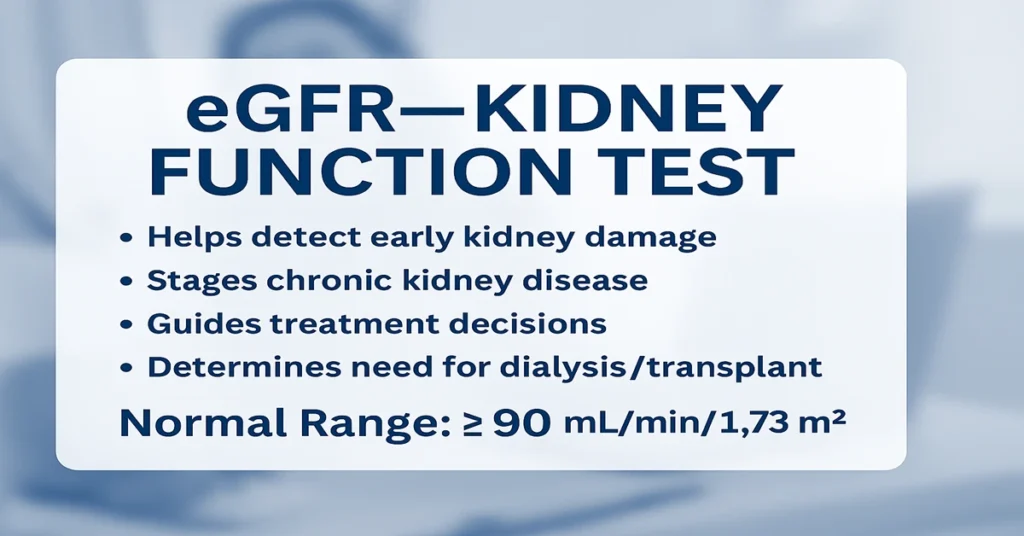What is eGFR?
eGFR stands for Estimated Glomerular Filtration Rate.
It is a blood test that measures how well your kidneys are filtering waste and excess fluid from the blood.
The test provides an estimate of overall kidney function and is one of the most important markers for detecting and monitoring Chronic Kidney Disease (CKD).
When kidney function declines, the eGFR value decreases — helping doctors identify the stage of kidney disease and plan treatment early.
Where is eGFR Produced or Calculated From?
Unlike other substances in the body, eGFR is not directly produced by any organ — it is calculated mathematically using a formula based on:
- Serum Creatinine Level (from a blood test)
- Age
- Gender
- Race (in some calculation models)
The two most commonly used formulas are:
- CKD-EPI (Chronic Kidney Disease Epidemiology Collaboration) — currently preferred for accuracy.
- MDRD (Modification of Diet in Renal Disease) — an older but still widely used method.
Because creatinine levels depend on muscle mass and age, eGFR provides a more accurate estimate of kidney performance than creatinine alone.
Main Functions and Importance
The eGFR test is one of the most useful and reliable indicators of kidney health.
Its main roles include:
- Early detection of kidney damage before symptoms appear.
- Staging Chronic Kidney Disease (CKD) to determine how advanced it is.
- Guiding treatment decisions and medication adjustments.
- Determining the need for dialysis or kidney transplantation.
- Monitoring kidney function in patients with diabetes, hypertension, or other chronic conditions.
Causes of Low eGFR (Poor Kidney Function)
A low eGFR value means the kidneys are not filtering blood efficiently.
Common causes include:
- Chronic Kidney Disease (CKD)
- Diabetes mellitus (the most common cause of kidney damage)
- Hypertension (High Blood Pressure)
- Glomerulonephritis (inflammation of kidney filters)
- Polycystic Kidney Disease (PKD)
- Dehydration
- Urinary Tract Obstruction (due to stones or prostate enlargement)
Other contributing factors may include autoimmune diseases, long-term use of painkillers (NSAIDs), or recurrent infections.
Symptoms of Low eGFR (Usually Below 60 mL/min/1.73 m²)
In the early stages of kidney disease, there are usually no visible symptoms.
As the condition progresses, symptoms may include:
- Swelling in the legs, feet, or ankles
- Fatigue and weakness
- Nausea or vomiting
- Loss of appetite
- Difficulty concentrating
- Dark, foamy, or reduced urine output
- High blood pressure
When eGFR drops below 15 mL/min/1.73 m², it may indicate end-stage kidney failure, requiring dialysis or transplantation.
Causes of High eGFR
High eGFR readings are rare and usually not a sign of disease.
Possible causes include:
- Pregnancy (due to increased blood flow and kidney function)
- High protein intake
- Overhydration
- Very low muscle mass (can make the eGFR seem falsely high)
- Lab or calculation error
Symptoms of High eGFR
A high eGFR value usually has no symptoms and often reflects a temporary or false elevation, especially in:
- Pregnant women
- People with low muscle mass
- Those consuming excessive fluids before the test
If your doctor suspects a false reading, the test may be repeated or confirmed with a Creatinine Clearance Test or Cystatin C Test.
Reference (Normal) eGFR Values
| eGFR (mL/min/1.73 m²) | Interpretation |
|---|---|
| ≥ 90 | Normal kidney function |
| 60–89 | Mild decrease (may be normal in older adults) |
| 30–59 | Moderate decrease – Stage 3 CKD |
| 15–29 | Severe decrease – Stage 4 CKD |
| <15 | Kidney failure – Stage 5 CKD (Dialysis or transplant may be needed) |
Note: eGFR values are adjusted for body surface area and may vary slightly depending on laboratory methods.
Sample Type
Sample Type: Serum (Blood Sample)
Tube Used: Red Top (Plain Tube)
Test Preparation
- No fasting is required before an eGFR test.
- Avoid high-protein meals before the test, as they can affect creatinine levels.
- Stay hydrated — dehydration can lower eGFR readings.
- Inform your doctor about any medications or supplements (especially creatine, NSAIDs, or antibiotics).
- Avoid heavy exercise 24 hours before testing.
When to Consult a Doctor
You should see a doctor if:
- Your eGFR is below 60 consistently in multiple tests.
- You have high blood pressure, diabetes, or a family history of kidney disease.
- You experience swelling, fatigue, or urine changes.
- You have protein or blood in your urine (as seen in a urine test).
- You feel nausea, vomiting, or confusion along with abnormal results.
Your doctor may recommend further tests such as Creatinine, BUN, Urine Protein, or Kidney Ultrasound.
Important Word Explanations
| Term | Meaning |
|---|---|
| eGFR | Estimated Glomerular Filtration Rate – an index of kidney function |
| Creatinine | A waste product used to calculate eGFR |
| CKD | Chronic Kidney Disease – long-term kidney damage |
| Dialysis | A treatment to filter blood when kidneys fail |
| Polycystic Kidney Disease (PKD) | A genetic disorder causing cysts in kidneys |
| Glomerulonephritis | Inflammation of kidney filtering units |
~END~

